翻译第十一讲(名词性从句&状语从句译法)
- 格式:ppt
- 大小:72.00 KB
- 文档页数:16
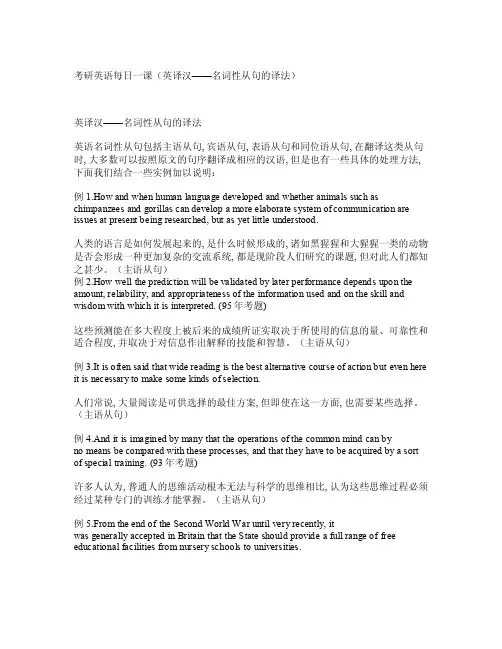
考研英语每日一课(英译汉——名词性从句的译法)英译汉——名词性从句的译法英语名词性从句包括主语从句,宾语从句, 表语从句和同位语从句, 在翻译这类从句时, 大多数可以按照原文的句序翻译成相应的汉语,但是也有一些具体的处理方法,下面我们结合一些实例加以说明:例1.How andwhenhuman lang uagedevel opedand w hethe r ani malssuchasch impan zeesand g orill as ca n dev elopa mor e ela borat e sys tem o f com munic ation areissue s atprese nt be ing r esear ched, butas ye t lit tle u nders tood.人类的语言是如何发展起来的, 是什么时候形成的, 诸如黑猩猩和大猩猩一类的动物是否会形成一种更加复杂的交流系统,都是现阶段人们研究的课题, 但对此人们都知之甚少。
(主语从句)例2.How w ell t he pr edict ion w ill b e val idate d bylater perf orman ce de pends upon theamoun t, re liabi lity, andappro priat eness of t he in forma tionusedand o n the skil l andwisd om wi th wh ich i t isinter prete d. (95年考题)这些预测能在多大程度上被后来的成绩所证实取决于所使用的信息的量、可靠性和适合程度,并取决于对信息作出解释的技能和智慧。
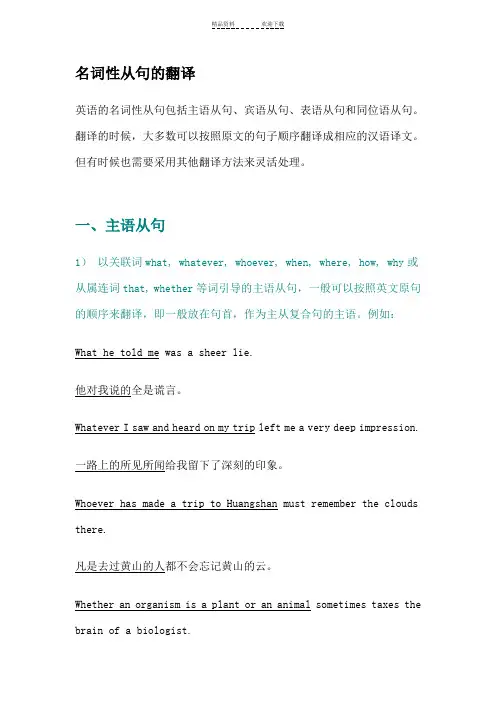
名词性从句的翻译英语的名词性从句包括主语从句、宾语从句、表语从句和同位语从句。
翻译的时候,大多数可以按照原文的句子顺序翻译成相应的汉语译文。
但有时候也需要采用其他翻译方法来灵活处理。
一、主语从句1)以关联词what, whatever, whoever, when, where, how, why或从属连词that, whether等词引导的主语从句,一般可以按照英文原句的顺序来翻译,即一般放在句首,作为主从复合句的主语。
例如:What he told me was a sheer lie.他对我说的全是谎言。
Whatever I saw and heard on my trip left me a very deep impression.一路上的所见所闻给我留下了深刻的印象。
Whoever has made a trip to Huangshan must remember the clouds there.凡是去过黄山的人都不会忘记黄山的云。
Whether an organism is a plant or an animal sometimes taxes the brain of a biologist.一种生物究竟是植物还是动物,有时会让生物学家颇伤脑筋。
2) 对于it作形式主语的主语从句,可以先译主句,顺译为无人称句。
有时也可先译从句,再译主句,这样的话,一般需要在主句前加译“这”。
需要注意的是,如果强调it,可以将其译出;如果不需要强调,也可不译。
例如:It is strange that she should have failed to see her own shortcomings.真奇怪,她竟然看不出自己的缺点。
It seemed incredible that she should have lied to us.她居然对我们说谎,这真是不可思议。
It doesn’t make much difference to me whether you come or not.你来不来我不在乎。
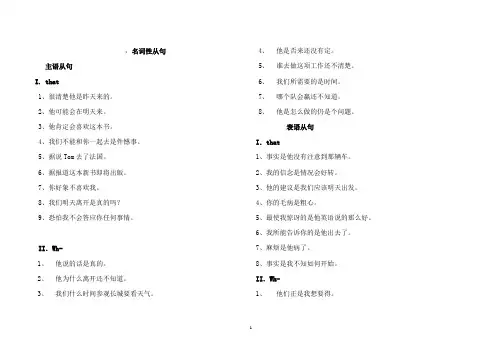
,名词性从句主语从句I. that1、很清楚他是昨天来的。
2、他可能会在明天来。
3、他肯定会喜欢这本书。
4、我们不能和你一起去是件憾事。
5、据说Tom去了法国。
6、据报道这本新书即将出版。
7、你好象不喜欢我。
8、我们明天离开是真的吗?9、恐怕我不会答应你任何事情。
II.Wh-1、他说的话是真的。
2、他为什么离开还不知道。
3、我们什么时间参观长城要看天气。
4、他是否来还没有定。
5、谁去做这项工作还不清楚。
6、我们所需要的是时间。
7、哪个队会赢还不知道。
8、他是怎么做的仍是个问题。
表语从句I.that1、事实是他没有注意到那辆车。
2、我的信念是情况会好转。
3、他的建议是我们应该明天出发。
4、你的毛病是粗心。
5、最使我惊讶的是他英语说的那么好。
6、我所能告诉你的是他出去了。
7、麻烦是他病了。
8、事实是我不知如何开始。
II.Wh-1、他们正是我想要得。
2、问题是它是否值得一做。
3、问提是我们该作些什么来帮助他。
4、问题是谁留下。
5、那就是他出生的地方。
6、我们就是这样分手的。
7、我是你正在找的那个人。
8、这就是我去那的原因同位语从句I.that1、我听到了我们队获胜的消息。
2、他在会上什么都没说的事实使我们惊讶。
3、他打算来的消息使我们高兴。
4、他已经下定学好英语的决心。
5、他当选的消息不是真的。
II.Wh-1、我不知道他什么时候来。
2、你不知道我多么着急。
3、很难回答你提出的我是如何做的问题。
4、我提出的如何邀请他的问题已经得到了解决。
5、你为什么对音乐感兴趣的问题还没回答。
宾语从句I. That clause1,我认为他们学习很努力。
2,他说他将在11日动身。
3,他告诉我医生马上就来。
4,他说他妈妈在读书。
5,他说他的爸爸生于1948年。
6,我恐怕犯了一个错误。
7,我们有把握成功。
8,对不起我错拿了你的钢笔。
II.Whether/ if1,我想知道他明天是否来。
2,我想知道你是否愿意和我一起去看足球赛。
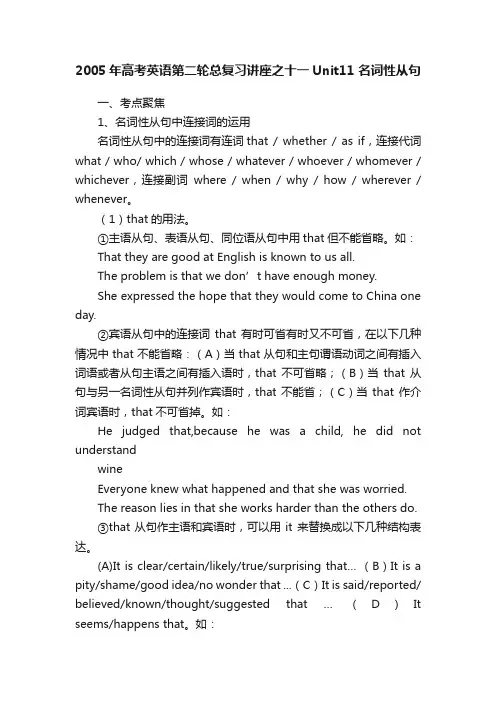
2005年高考英语第二轮总复习讲座之十一Unit11 名词性从句一、考点聚焦1、名词性从句中连接词的运用名词性从句中的连接词有连词that / whether / as if,连接代词what / who/ which / whose / whatever / whoever / whomever / whichever,连接副词where / when / why / how / wherever / whenever。
(1)that的用法。
①主语从句、表语从句、同位语从句中用that但不能省略。
如:That they are good at English is known to us all.The problem is that we don’t have enough money.She expressed the hope that they would come to China one day.②宾语从句中的连接词that有时可省有时又不可省,在以下几种情况中that不能省略:(A)当that从句和主句谓语动词之间有插入词语或者从句主语之间有插入语时,that不可省略;(B)当that 从句与另一名词性从句并列作宾语时,that不能省;(C)当that作介词宾语时,that不可省掉。
如:He judged that,because he was a child, he did not understandwineEveryone knew what happened and that she was worried.The reason lies in that she works harder than the others do.③that从句作主语和宾语时,可以用it 来替换成以下几种结构表达。
(A)It is clear/certain/likely/true/surprising that… (B)It is a pity/shame/good idea/no wonder that ...(C)It is said/reported/ believed/known/thought/suggested that … (D)It seems/happens that。

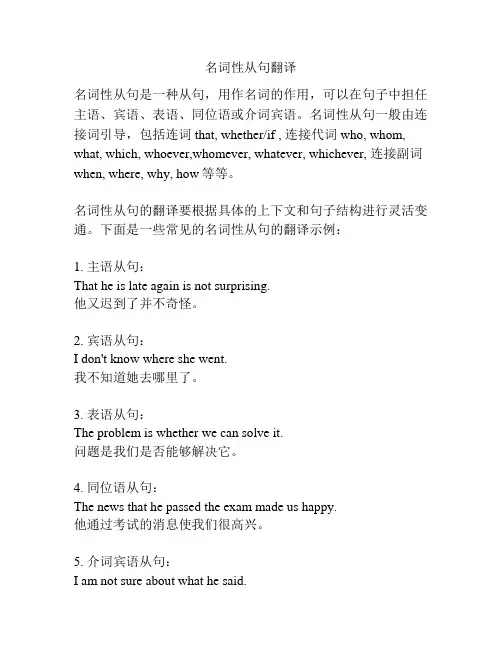
名词性从句翻译名词性从句是一种从句,用作名词的作用,可以在句子中担任主语、宾语、表语、同位语或介词宾语。
名词性从句一般由连接词引导,包括连词that, whether/if , 连接代词who, whom, what, which, whoever,whomever, whatever, whichever, 连接副词when, where, why, how等等。
名词性从句的翻译要根据具体的上下文和句子结构进行灵活变通。
下面是一些常见的名词性从句的翻译示例:1. 主语从句:That he is late again is not surprising.他又迟到了并不奇怪。
2. 宾语从句:I don't know where she went.我不知道她去哪里了。
3. 表语从句:The problem is whether we can solve it.问题是我们是否能够解决它。
4. 同位语从句:The news that he passed the exam made us happy.他通过考试的消息使我们很高兴。
5. 介词宾语从句:I am not sure about what he said.我不确定他说的是什么。
6. 间接引导名词性从句:He asked where I lived.他问我住在哪里。
7. 是否从句:I wonder whether/if she will come to the party.我想知道她是否会来参加派对。
8. 选择性从句:He asked me whether I preferred coffee or tea.他问我是喜欢咖啡还是茶。
9. 宾语从句(陈述句变为疑问句):Do you know what time it is?你知道现在几点钟吗?10. 宾语从句(连接代词):I wonder who is going to pick us up at the airport.我想知道谁会在机场接我们。
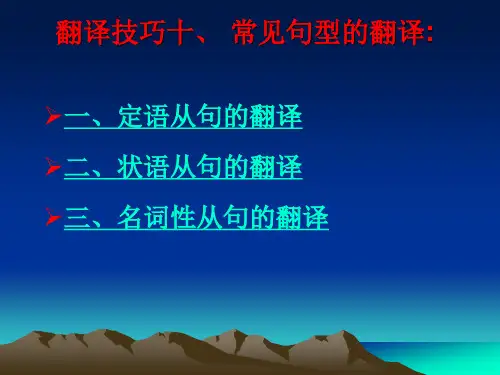
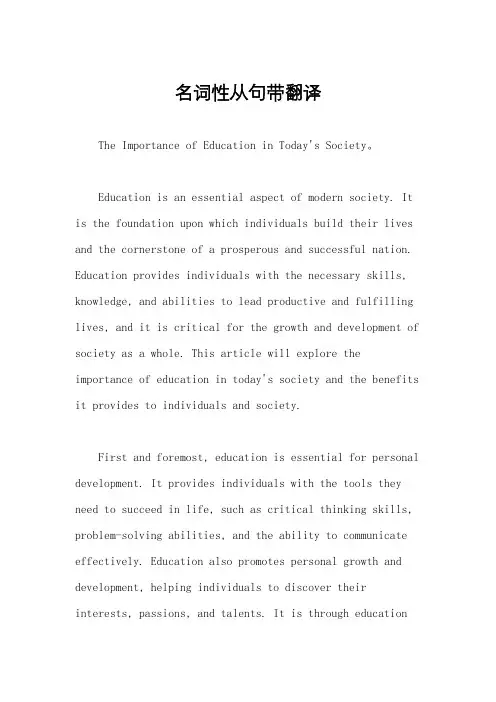
名词性从句带翻译The Importance of Education in Today's Society。
Education is an essential aspect of modern society. It is the foundation upon which individuals build their lives and the cornerstone of a prosperous and successful nation. Education provides individuals with the necessary skills, knowledge, and abilities to lead productive and fulfilling lives, and it is critical for the growth and development of society as a whole. This article will explore the importance of education in today's society and the benefits it provides to individuals and society.First and foremost, education is essential for personal development. It provides individuals with the tools they need to succeed in life, such as critical thinking skills, problem-solving abilities, and the ability to communicate effectively. Education also promotes personal growth and development, helping individuals to discover their interests, passions, and talents. It is through educationthat individuals can realize their full potential and achieve their goals.In addition to personal development, education is critical for economic development. In today's global economy, education is the key to success. It provides individuals with the skills and knowledge they need to compete in the workforce and contribute to the economy. A well-educated workforce is essential for the growth and development of businesses and industries, and it iscritical for the economic success of a nation.Education also plays a crucial role in promoting social mobility and reducing inequality. It provides individuals from all backgrounds with the opportunity to improve their lives and achieve their goals, regardless of their social or economic status. Education is a powerful tool for breaking down barriers and creating a more equitable society.Furthermore, education is essential for promoting democracy and civic engagement. It provides individualswith the knowledge and skills they need to participate in the democratic process and make informed decisions. Education also promotes civic responsibility, encouraging individuals to be active and engaged members of their communities.Finally, education is critical for promoting global understanding and cooperation. In today's interconnected world, education is essential for promoting cultural understanding and tolerance. It provides individuals with the knowledge and skills they need to communicate effectively with people from different cultures and backgrounds, promoting peace and cooperation on a global scale.In conclusion, education is essential for personal, economic, and social development. It provides individuals with the tools they need to succeed in life, contributes to the growth and development of society, and promotes democracy, social mobility, and global understanding. As such, education should be a top priority for individuals, governments, and societies around the world.。
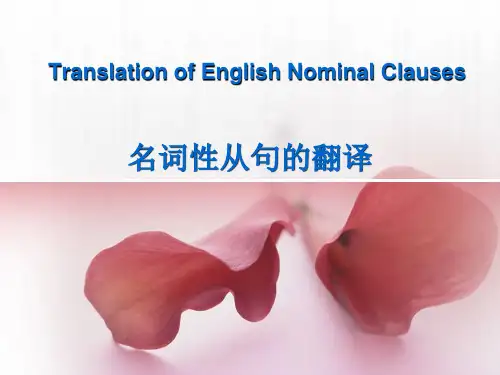

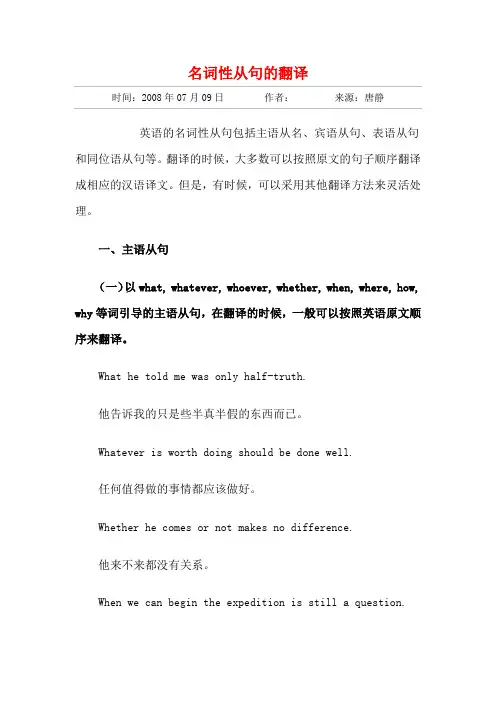
名词性从句的翻译时间:2008年07月09日作者:来源:唐静英语的名词性从句包括主语从名、宾语从句、表语从句和同位语从句等。
翻译的时候,大多数可以按照原文的句子顺序翻译成相应的汉语译文。
但是,有时候,可以采用其他翻译方法来灵活处理。
一、主语从句(一)以what, whatever, whoever, whether, when, where, how, why等词引导的主语从句,在翻译的时候,一般可以按照英语原文顺序来翻译。
What he told me was only half-truth.他告诉我的只是些半真半假的东西而已。
Whatever is worth doing should be done well.任何值得做的事情都应该做好。
Whether he comes or not makes no difference.他来不来都没有关系。
When we can begin the expedition is still a question.我们何时才能开始这次考察仍然是悬而未决。
How he is going to do it is a mystery.他准备怎么做这个事情是个迷。
(二)用it作形式主语的主语从句,可以把主语从句放到汉语句子最前面去翻译。
为了强调起见,it一般可以译出来;如果不需要强调,it也可以不译出来。
It doesn’t make much difference whether he attends the meeting or not.他参加不参加会议没有多大关系。
(It没有翻译)It seemed inconceivable that the pilot could have survived the crash.驾驶员在飞机坠毁之后,竟然还能活着,这看来是不可想象的。
(It翻译为“这”)有时候,如果主语从句仍然按照英语原来的顺序翻译的话,it 一般不需要译出来。
主语从句1、这个教材是否可用于我们的学校还未讨论过。
(whether2、使我最感到吃惊的是他态度的突然转变。
(what3、2010年世博会将在上海举行已成定局。
(that4、所有国家都同意,绝不攻击带有红十字标记的任何物体。
(whatever5、这次计划将如何执行仍需讨论。
(how6、一本书是否畅销取决于诸多因素。
(Whether(上海市高考题以it为形式主语的主从复合句1、他看来不愿意对这件事作进一步的评论。
(seem2、你喝了那么多咖啡难怪你睡不着。
(no wonder3、据估计,飞到火星上来回一趟需要一年半多的时间。
(estimate4、他碰巧以前做过类似的练习。
(happen5、他真的打算一路乘火车去莫斯科。
(true6、一切物质都是原子构成的,这是众所周知的事实。
(fact7、这种材料能否用在我们工厂还是一个问题。
(question8、业已证明他们的建议在一定程度上是合理的。
(prove9、原来他根本没出过国,也根本不是华侨。
(turn out10、下一班火车什么时候去西藏通知了没有?(announce11、新产品销路好不好取决于它的质量。
(whether12、据报道这种野生植物含有丰富的维生素。
(It(上海市高考题宾语从句1、汤姆希望成为任何一个能与他分享兴趣的人的朋友。
(whoever2、他们祖父当时也算是第一批就在这如今著名旅游胜地的地方安家的。
(what3、除非下雨,这位老人每天都散步。
(except4、我们问门卫办公室下午五点是否还开着。
(whether5、我爸爸说我可以选任何一件看上去适合我的衣服。
(whichever6、我们应该仔细地取出任何可能对年轻人有害的东西。
(whatever7、你能否告诉我为什么离开教室时不关灯?(why8、他除了喜欢偶尔下下棋外没多少别的爱好。
(except以IT为形式并与的主从复合句1、不要想当然地认为所有问题通过一次讨论就能解决。
2、我们认为每个市民都讲礼貌是很重要的。
英语名词性从句的翻译英语名词性从句包括主语从句, 宾语从句, 表语从句和同位语从句, 在翻译这类从句时, 大多数可以按照原文的句序翻译成相应的汉语, 但是也有一些具体的处理方法, 下面我们结合一些实例加以说明:例1.How and when human language developed and whether animals such as chimpanzees and gorillas can develop a more elaborate system of communication are issues at present being researched, but as yet little understood.人类的语言是如何发展起来的, 是什么时候形成的, 诸如黑猩猩和大猩猩一类的动物是否会形成一种更加复杂的交流系统, 都是现阶段人们研究的课题, 但对此人们都知之甚少。
(主语从句)例2.How well the prediction will be validated by later performance depends upon the amount, reliability, and appropriateness of the information used and on the skill and wisdom with which it is interpreted. (95年考题)这些预测能在多大程度上被后来的成绩所证实取决于所使用的信息的量、可靠性和适合程度, 并取决于对信息作出解释的技能和智慧。
(主语从句)例3.It is often said that wide reading is the best alternative course of action but even here it is necessary to make some kinds of selection.人们常说, 大量阅读是可供选择的最佳方案, 但即使在这一方面, 也需要某些选择。
名词性从句翻译一.总结:“....的是....”,用what....is....结构。
1.我想要的是本书。
What (所。
的)I want is a book.2.我们需要的是更多的时间。
What we need is more time.二.1.不清楚他为什么迟到。
It is not clear why he was late.2.不知道他要去哪里、It is unknown where he will go.3.很遗憾我们不能去。
It is a pity that we can not go.4.很可能她告诉他了一切。
It is possible that she told him everything.5.很奇怪他没来。
It is strange that he didn’t come.6.很明显我是正确的。
It is obvious that I am right.7.令人惊奇的是他没来。
It is a surprise that he didn’t come.8.事实是他爱你。
It is a fact that he loves you.总结:注意以上例句,不清楚,不知道等都没有主语,没有说谁不知道,谁不清楚,什么很遗憾,此种情况下用it+be+形容词+主语从句或it+be+名词+主语从句;但如果有主语了,我很清楚,我很确定,我很好奇的话就得用宾语从句中“主语+be+形容词+宾语从句”的结构,比如:1.我很确定我该做什么。
I am clear what I should do.2.我很好奇他将说什么。
I am curious what he will say.3.我很害怕他不来。
I am afraid that he won’t come.补充:I am afraid也可翻译成“恐怕。
”三.1.你学英语很必要。
It is necessary that you learn english.2.地球是圆的是常识。